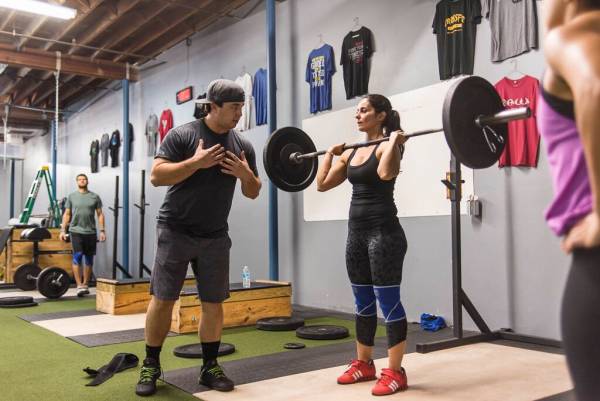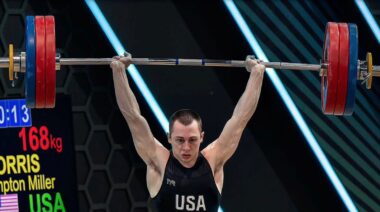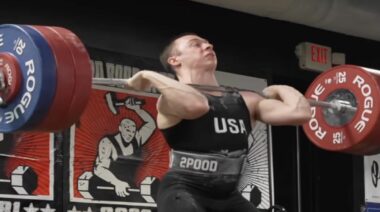As a weightlifting coach, I’m frequently asked about online coaching. But I don’t know of any well-established coaches who are interested in coaching this way, and in fact, I’m not sure what the term means.
My guess is that some coaches have introduced the concept into the market without really considering all the factors involved. And some trainees have bought into the concept without realizing the difficulties it presents.
None of the Top Weightlifters Are Distance Coached
Let me start off by saying that none of the top weightlifters in the world are distance coached. The reason for this is that it is cumbersome and relatively ineffective, and that weightlifting works best when it is conducted in an atmosphere consisting of other top lifters training simultaneously. I’ve seen online coaching offered by obscure coaches, with obscure meaning that I haven’t bumped into them at the warm-up room at national events.
Every aspect of training, from the fundamentals to technique, are best learned in person.
Anyone doing distance coaching needs to observe the training session of each athlete in its entirety. If the athletes are in two or more different locales, then doing so could occupy as much as twelve hours of the day.
I don’t believe we’re seeing a demand for online coaching of soccer, basketball, ice hockey, or any of the sports that are considered true sports. So, I don’t know why some people have decided to disparage weightlifting by assuming it is coachable from a distance.
Coaching Works Best When There Is Immediate Feedback
Unless the distance coach is using an application like Skype, immediate feedback is not a possibility. If Skype is the vehicle of choice, the amount of real time spent watching a training session can be an inefficient use of time for the coach.
“The performance of all these functions cannot take place through distance coaching, so there must be a compromise in quality from the start.”
Coaching an athlete who is already technique proficient requires more subtle coaching, but for a coach to get a good fix on how the designed training program is working, most if not all of the training sessions need to be observed.
The Entire Training Sessions Needs to Be Monitored
The function of a weightlifting coach, once the athlete has mastered technique and developed the capacity to assume larger and more frequent training loads, is to monitor and modify the training so that progress is maintained, unnecessary injuries are minimized, and the eventual goals of the career are achieved.
In order to do this effectively, a coach needs to be present for all, if not most, training sessions while paying attention to the speed, motor patterns, energy levels, and other relevant factors in order to make appropriate modifications in the training program. So I don’t really know what is being offered as online coaching of weightlifting, nor what is being expected of it by customers.
What’s Involved With Actual Coaching
When I coach an athlete, I prefer to be the one who is starting him off from day one. I can teach proper technique, proper work habits, and proper attitude. I design the program, designate the weights to be lifted, and monitor each sessions. I make corrections in technique when necessary, modify training loads and training frequencies, and prescribe different exercises as difference developmental problems present themselves. I determine the competition calendar and keep the athlete’s attention focused on the competitive event. I also provide some oversight regarding lifestyle decisions.

Coaching doesn’t only involve the sport itself – you need to help your athletes develop good habits and work ethic.
I do all these things by coaching my athletes on a daily basis just like coaches do in any other sport. The performance of all these functions cannot take place through distance coaching, so there must be a compromise in quality from the start.
So the Next Best Thing Could Be…
There are two major divisions to the process of weightlifting coaching. The first is to coach proper technique while programming exercises that will remediate any weaknesses. The second is to design the training over a long period and monitor it so that proper adjustments can be made.
- Technique can be learned without coaching. At one time all the lifters in this country learned technique on their own. There were no coaches. The better athletes learned it quite well. There is currently more information available for learning technique than at any other time during my association with the sport (around 53 years). That said, for the average lifter, a good coach will shorten the amount of time necessary to master proficient technique.
So it is possible to learn technique on your own or you could visit a coach for a session maybe twice a week and that would also shorten the amount of time it takes to gain technical mastery. Learning to lift through the distance paradigm is not as effective as being coached in person, and in the end could take a great deal of time.
“When I coach an athlete, I prefer to be the one who is starting him off from day one. I can teach proper technique, proper work habits, and proper attitude.”
- Programming is an easier problem to solve. Getting programming online is a more feasible proposition and that is what we at Takano Athletics are currently offering. TrainHeroic is now posting the training programs from a number of different coaches. Right now, we are offering the exact training programs that I am writing for the athletes who train with me on a daily basis. We offer beginner, intermediate, and advanced programs.
These are the same programs my athletes use to make regular and steady progress toward their potentials over an extended period of time. Although there are plenty of training programs available online, there is no guarantee that they have been tested nor that they have been effective. My training programs have been used over the years to develop hundreds of lifters from day one to the peak of their careers. And now they are available to you.
We may not be able to solve your technical proficiency but we can provide you with the proven programming to help you reach your potential.
Check out these related articles:
- Why Distance Coaching Doesn’t Work for Olympic Weightlifting
- The Effectiveness of Training Long-Distance Clients Over the Internet
- Some Thoughts On the Instruction of Weightlifting
- What’s New On Pulse Beat Fit Today
Photos courtesy of CrossFit Empirical.






